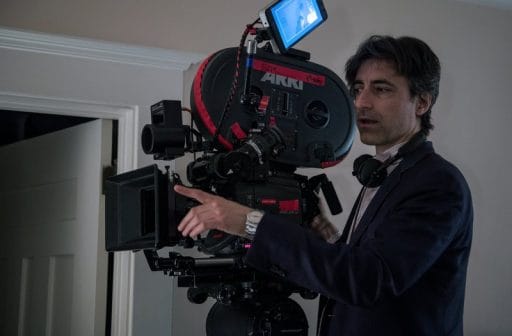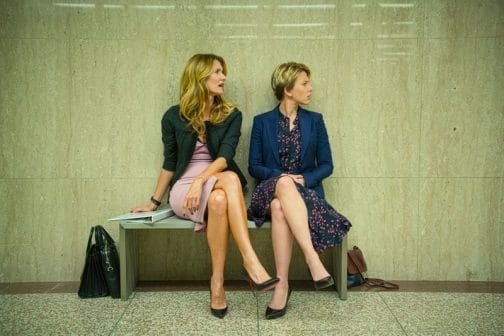Noah Baumbach on Marriage Story

Writer-director Noah Baumbach on the set of his new film Marriage Story, which is now streaming on Netflix.
by DAN LYBARGER Special to the Democrat-Gazette | December 20, 2019
Noah Baumbach’s Marriage Story, currently streaming on Netflix and showing in some theatrical markets, garnered Screen Actors Guild nominations for stars Adam Driver, Scarlett Johansson and Laura Dern. Baumbach himself has received Independent Spirit nominations for his directing and his screenplay.
All of this might not have happened if Baumbach had not depicted the environment where an actress (Johansson) and a stage director (Driver) experience the decay of their marriage accurately. In fact, some of the sets were built in the same office towers where real-life divorce attorney Laura Wasser, whom Baumbach contacted for the film, operates.
The attorneys in the film played by Dern, Alan Alda and Ray Liotta have distinctive spaces. Alda’s pleasant but ineffectual lawyer is based in a crumbling strip mall, while Liotta’s projects a cold atmosphere that intimidates opposing counsel.
“We recreated them. We were in office buildings, but we were using empty spaces so we could build them sort of how we wanted them to look,” says Baumbach over the phone last week.
“Each lawyer has an office that reflects them in some way: Ray’s character’s office vs. Laura’s character’s office vs. Alan’s character’s office. They’re all impersonal, professional spaces by design. They all have white walls, predominantly. So we would sort of design each one specifically for the effect that we wanted to get with each particular scene.”
Baumbach demonstrates a similar eye for detail in how he depicts a brutal hearing where Dern and Liotta reveal damning information about each other’s clients as Johansson and Driver duck in shame. Their characters, Nicole and Charlie, had initially agreed to end the marriage without attorneys and blush when embarrassing revelations about themselves are yelled at peak volume or when legal counsels go for the jugular when their clients would not.
“In the courtroom, I shot everything down the table because everything is from Adam and Scarlett’s point of view. We kept the camera on either end of the table. We could go closer or a little further back, depending on the shot. That way, we’re not looking at it from the judge’s perspective. We’re not looking at it from the people who are waiting perspective. It all stays in that world. That’s true of all the scenes that are among those groups of lawyers with Charlie and Nicole,” Baumbach says. “All those scenes are blocked out and rehearsed extensively so that when we’re shooting them, we have a real framework in place that everybody has spent some time with, and then that gives the actors the freedom to do what they have to do, which is be in the moment and play off each other. I think having that structure allows for that freedom.”
Baumbach constructed Marriage Story itself by alternating between Charlie and Nicole’s angles on how the marriage and the divorce are going. The characters even begin with reciting essays about each other that the audience hears but that the couple end up not reading to each other.
“The movie is about perspective, and visually, we always kept it from their perspectives because it’s about perspectives on their relationship, on their marriage, on their divorce, on their parenting, on their own lives. The opening of the movie is two different perspectives. It’s his perspective on her and her perspective on him. All of that is baked into the story,” he says. “We know (the parallel essay assignment) was an exercise that the mediator (Robert Smigel, aka Triumph the Insult Comic Dog) gives them and explains why he does it in the movie. When we see them at that point, the marriage seems to be already going in a certain direction.”
From the Inside
Family dysfunction and adults refusing to behave like grownups has been a recurring theme in Baumbach’s movies. His 1995 debut Kicking and Screaming dealt with college students who dread the prospect of graduating and avoid it as long as possible.
The Squid and the Whale mirrors the divorce of his parents, novelist Jonathan Baumbach and critic Georgia Brown, while Marriage Story resembles portions of his own breakup with actor-filmmaker Jennifer Jason Leigh. The previous breakup story is from the point of view of the children, while the current tale is from that of the parents.
When asked if he could have made an even-handed movie about a breakup earlier in his career, Baumbach cautiously answers, “I think all of my movies are the movie I’m able to make at the time. I think of it more specifically to each movie. I find myself drawn to the material at the time I’m drawn to the material so that when I’m ready to do it, I’m ready to do it. I don’t really look at it as ‘I couldn’t have done it 10 years ago.’ I don’t know that it’s really apples-to-apples that way. It’s just that this is the movie I’ve made now.”
While his movies might be set in places where he’s lived or visited like New York or Los Angeles, his characters’ struggles are relatable in just about any spot on the globe. Charlie takes a long time to realize that Nicole went along with him for certain events not because she enjoyed them but simply because he was doing it, and many couples don’t realize how deep their material and emotional bonds were until they’ve broken up.
When asked if people relate their own stories of heartbreak to The Squid and the Whale or Marriage Story, Baumbach replies, “Oh, yeah. I do. Particularly with this movie. I’ve been traveling with it for a little while. It’s been gratifying to hear peoples’ stories and have the movie reflected back to me from other people.”
Keeping the Fantasy Real
Baumbach has explored make-believe worlds as a screenwriter and shown some remarkable aptitude. Fantastic Mr. Fox, which he co-wrote with director Wes Anderson, is in The Criterion Collection, and he also co-authored the script for Madagascar: Europe’s Most Wanted, which is the best-reviewed movie in the series.
When I bring up his forays into animation, he starts laughing and then happily recalls, “I had good collaborators. With Fantastic Mr. Fox, I had Wes (Anderson), who’s amazing. He made a classic out of the script we wrote together. With Madagascar: Europe’s Most Wanted, the people at DreamWorks at the time were really wonderful. They knew those characters so well, and I tried to be added value where I could be.”

Nora (Laura Dern) is an aggressive family law attorney who guides her client Nicole (Scarlett Johansson) through the dizzying world of the “divorce-industrial complex” in Noah Baumbach’s Marriage Story.
MovieStyle on 12/20/2019
Print Headline: Noah Baumbach on Marriage Story
| DAN LYBARGER

Dan Lybarger is a freelance film critic and writer whose work has appeared in The Kansas City Star, The Pitch, The Arkansas Democrat-Gazette, Cineaste and other publications.
